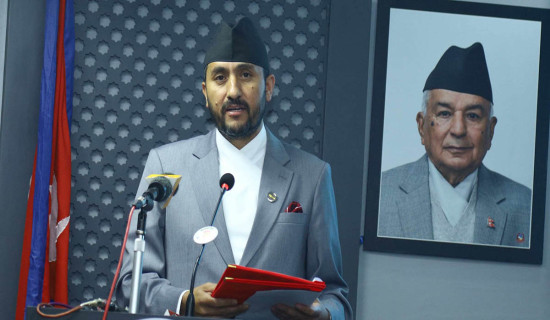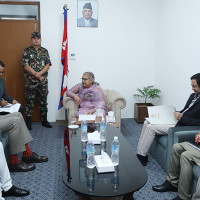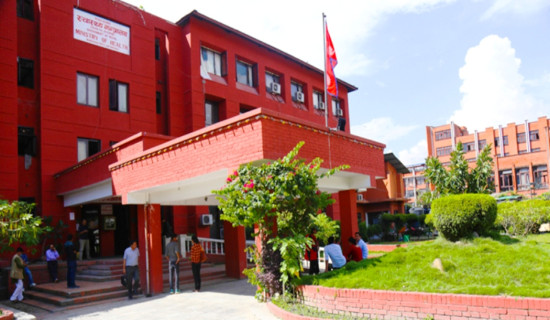- Friday, 31 October 2025
‘Our new budget will focus on educational reforms’
Lalkesh Jaisi was elected as the Chairman of the Tanjakot Rural Municipality in Humla districtin the 2022 local-level election. Jaisi, 49, was underground for four years during the Maoist insurgency. He claims that his rural municipality has achieved significant progress in roads and electricity compared to other rural municipalities. He is now focused on transforming the entire rural municipality into an agricultural hub. Our Humal correspondent, Rajan Rawat talked to him recently. Excerpts:
What remarkable things have you accomplished in your present term?
We have started depositing wage directly into the workers’ accounts, developed and implemented local curriculum in education, initiated the construction of permanent structures in schools and have organised various training programmes. We have already started construction works on six school buildings.
We have implemented integrated supplementary activities, facilitated excellent schools, honoured outstanding teachers, students and schools, formulated school consolidation policies, unified examination system, conducted health checkups at citizens' homes and completed the construction of a 10-bed hospital.
Remarkable achievements have been made in the areas of electricity and road expansion. Awareness programmes have been conducted, and approximately Rs. 80 million have been invested in agricultural production, creating employment for 11 individuals from that investment
How do you plan to develop the rural municipality during your tenure?
According to the Constitution of Nepal, efforts have been initiated to establish socialism and ensure the prosperity and happiness of citizens. Some tasks have been accomplished in this regard. We have connected all wards with the national road network and electricity has reached all settlements. We are working to develop the municipality into a hub for fruit farming as the climate supports fruit farming in this area.
How has the rural municipality incorporated its priorities into this year's budget and programmes?
Development cannot be achieved without improvement in education infrastructure and raising income sources of the citizens. Thus, we have prioritised the educational sector in this year's budget and programmes. We have made efforts to advance the concept of residential schools for quality education, and provision has been made in this year's budget to facilitate residential schools.
Internal sources are limited, but the needs are plentiful. How will you address this problem?
Certainly, we don’t have sufficient internal sources. However, this isn't a new problem faced by the rural municipalities. We are making continuous efforts to prioritise programmes from the available sources by full and integrated mobilisation of sources at the federal, provincial and local levels. Due to the lack of means and sources, collective needs have been prioritised over individual demands.
What are the prerequisites for the development of the rural municipality?
Education, health, drinking water and sanitation, and environment-friendly infrastructures are the prerequisites for the development of the rural municipality. Agriculture, forestry and tourism too are equally important. If it can be developed, there's no denying the possibility of transforming the rural municipality.
For this, work has been started in the agricultural sector. Apple cultivation has been expanded in the pocket areas. Similarly, pear and banana cultivation has also been expanded. With good prospects for fruit cultivation, transportation of produce will be facilitated especially loading empty trucks coming from Humla, enhancing the livelihoods of farmers directly.
It is time to formulate the next year's budget, what will be the priority?
The budget for the upcoming year will pay special attention to reforms in the education sector. Even though there have been some amendments in education-related laws and regulations, efforts will be made to further improve them and reduce the number of schools while providing quality education. Additionally, priority will be given to developing the municipality as an agricultural hub.
Is it easier to work when representatives are elected from a coalition?
It becomes easier to work when the goal of all parties in the coalition is the development of the local level. We have a common understanding of the matters uplifting our local level. There have been no dispute or disagreement in decisions made by the executive body. The unanimity in all decisions confirms that the work is progressing smoothly.
How is the coordination with the provincial and federal governments?
Efforts have been made from our side to coordinate with both the federal and provincial levels, but cooperation has not been achieved. They are moving forward in their own way, and there seems a lack of coordination among us to a certain level. Federal and provincial levels need to coordinate with us to achieve their common goal.
In reality, the local level is the government at the doorstep of the people. However, the governments at the upper levels have not given attention to this.
What are the problems and challenges you have witnessed in the municipality?
We have been experiencing problems in the implementation of laws and rules due to the lack of coordination between the federal and provincial structures. The red tape while doing work has not faded yet, although we have tried our best to accelerate the work at the local level.
Lack of sufficient resources and means is also another burning issue. There is no internal source thus no internal revenue can be collected. Efforts are being made to address these problems. Although these problems persist, we have been making efforts to move forward by overcoming these hurdles.
How do you view the current budget allocation system of the country?
The current budget allocation system is not justifiable for local levels like us who have fewer internal resources and means. If budget allocation is based solely on population. Another point is that the distribution system should also consider geography, remoteness and sources of income.
How did you feel after reading this news?





-square-thumb.jpg)


-square-thumb.jpg)








